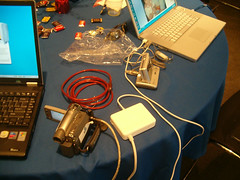 Download .mp3
Download .mp3
Chris Craft (a man who is quickly becoming one of my favorite bloggers)
wrote a post yesterday that I find difficult to sum up in an introduction. He had a few insights that spoke to me, partially because art and foreign language are both lumped outside that tightly knit group of "core" subjects. (I continue to believe that a "core" subject should be any subject that prepares you for the real world. For me, my art classes were some of the most important core classes I had.)
But one thing that sent a shiver down my spine was when he quoted another blogger named Christian:
"Instead, get kids to begin to define their stake in the world .... Otherwise, tomorrow's 'blogging assignment' is merely yesterday's boorish 'PowerPoint presentation' ..."

My goodness, that's scary! For years I've fought against the idea of giving the students an annual PowerPoint assignment as a halfhearted attempt to fulfill some technology integration requirement, and to see today's blogs become yesterday's PowerPoints would be like taking Web 2.0 and turning it into Web Beta.
And yet Chris and I have a similar dilemma - how exactly are we supposed to get our students where they need to be with information literacy if we barely have time to teach them our official subject areas?
As much as I love my job, the kids I get to see most often are the ones in my art club. Our weekly meetings give me only an hour of instruction time with the kids, so setting up the back end involved in getting students to start blogging on their own is much harder than it could be for a classroom teacher teaching the same grade level.
Well, I have three choices. I can whine about it, forget it, or do something about it. I've just finished my whining (and yes, it did make me feel better) and I'm too much of a geek to just forget about it, so It's about time I start doing something, right?

The key thing I have to remember is that I'm not alone. In some ways I'm in a great situation, because K-6 students have very few teachers. For those grades that do team teaching I can collaborate with one teacher and actually cover every student in that grade level, and it's the upper grades that are more likely to be taught in teams.
So there's a way to divide the work load (and get more face time with the students), provided I can get certain teachers into the whole blogging thing.
Beyond that, there's still a lot of work. We'll simultaneously have to drill the students on internet safety, show them just how easy it is to blog and comment on the blogs of others, and give them writing prompts that will encourage them to give answers that are more than just copied out of their textbooks.
Yeah, I never said it would be easy. But the collaboration will make it easier, I'm sure.
 ... well, actually a bit more than that. Today I brought my new toy into work, and just had to show it off to the media specialist. She liked what she saw, and liked the price tag (only $220!) even more.
... well, actually a bit more than that. Today I brought my new toy into work, and just had to show it off to the media specialist. She liked what she saw, and liked the price tag (only $220!) even more.



